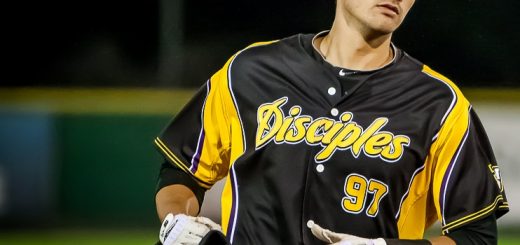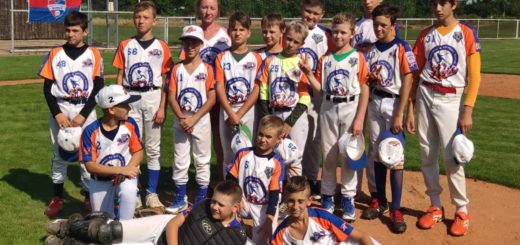Ukraine team grateful to be in the World Series and the USA
The most grateful team to be in Taylor this week for the Junior League World Series of baseball may not be team that wins it.
A group of teen-agers from Kropyvnytsky, Ukraine, overcame the odds to qualify to play in the series and then almost didn’t get to come.
Once they got here, they endured lost baseball bats, a language barrier and a disparity in talent. They lost their first two games.
Despite all the challenges, the 12 players, manager and coach are just glad to be here.
The Team
Located more than 5,000 miles away from Taylor, Kropyvnytsky is in central Ukraine. Most of the people who live there are not well off financially. Basil Tarasko, the district administrator of Little League in Ukraine, said the average monthly salary for a family of four is about $270 a month.
The boys scrape to get equipment. They rely on the kindness of strangers to get bats, balls and gloves donated. While other players wear cleats, they wear tennis shoes.
Yet, 12 boys came together as all-star baseball players who were committed to doing the best they could. They traveled from Ukraine to Kutno, Poland, taking a bus and two trains to the baseball complex, site of the regional tournament for teams from Europe, the Middle East and Africa. The Ukraine boys had to cross the border into Poland on foot.
Against all odds, they went 2-2 in pool play: losing to Italy and Germany and defeating Lithuania and Belarus. Third place in the pool was good enough to advance. Ukraine went on to defeat Moldova and unbeaten Italy in the semifinals. In the championship game against England, they scored three runs in last inning and won the game, 3-2.
The championship meant they qualified to play in the Junior League World Series in the far off city of Taylor, Michigan, in the United States.
Just because they qualified didn’t mean they could go. As Tarasko would discover, the players and coaching staff needed visas – and it appeared too late to get them in time to make the trip.
Tarasko, a retired New York school teacher who has traveled to Ukraine 46 times, contacted everyone he could from Little League International, government officials in the United States and Ukraine and everyone in between, including World Series Director Greg Bzura.
“How do we get those kids from Ukraine into the U.S. this coming Saturday (Aug. 11) in time to face the Latin American champ on Sunday?” Tarasko’s e-mail said. “Plane tickets are paid for, housing is set and the hot dogs and hamburgers are being barbecued for this once-in-a-lifetime opportunity play an American sport by innocent children who cannot buy a bat, glove or ball in Ukraine, yet they play American baseball, play it well and love it.
“All deserving children who have proved that they are the best should be there in Taylor, Michigan. This is a once in a lifetime opportunity for all children to play baseball in the United States, home of baseball. I reach out and respectfully ask for help. Let’s get our Ukrainian children into the U.S.”
As the players wrote about 100 letters, Tarasko issued a plea for anyone who could help. Through e-mails and phone calls, he eventually connected with the personal assistant to the U.S. Ambassador to Ukraine. Somehow, the arrangements were made for the boys and their coaches to be interviewed for visas in Kyiv, the capital city of Ukraine.
The players and their parents secured a bus and made the five- to six-hour trip. They parents had to miss work and had to buy food for the trip as well as pay for the bus. Since the appointment was at 9 a.m., they were forced to travel half the night.
After the interviews, they waited until the end of the day. When the boys discovered the visas would be issued, the contingent returned home.
Tarasko, who cried tears of joy when he heard the results, wants Little League to reimburse the boys’ parents for the $100 visa application fee.
“Every child should be treated the same,” he said. “Why should parents in one country pay an entrance fee into the country where baseball was founded? It’s not fair. It’s not a level playing field.”
On Saturday, he received a message from Steve Keener, president of Little League International, that his staff was working on the issue.
By then, the Ukraine team had arrived in Taylor, ready to take on the best teams in the world. However, there was one problem: there bats were misplaced by the airline.
Borrowing bats, the Ukraine boys scored first before eventually falling, 12-4, to the Latin America champions from St. Thomas, U.S. Virgin Islands.
Tarasko spread the word to the Ukraine community in metro Detroit that the boys were in Taylor. Spectators at Heritage Park noted that the visitors were wearing tennis shoes, while their opponents were wearing spikes. Some donated snacks and drinks.
Chuck Jones, the proprietor at Play It Again Sports in Southgate, donated 12 pairs of cleats to the team. Another donor provided bat bags. Bill Gallagher, a reporter with Fox 2 News, arranged for the Detroit Tigers to donate two sets of Tigers shirts to the players and coaches.
The Ukraine boys lost their second game to Guayama, Puerto Rico, 8-1.
With an 0-2 record and with games against Canada and the Philippines ahead, the chances of becoming world champions were miniscule.
The Player
There really is not much typical about Oleksiy Nezheborets.
He stands out in any crowd, much less a group of kids his age. Recently turned 15, Nezheborets jumped to 6 feet, 6 inches tall – making him the tallest player at the Junior League World Series in Taylor.
Typically, Nezheborets plays first base and pitches. But in the regional finals, he was moved to third base and his team won. He started at third in the World Series opener as well.
And, on a team of Ukranian-speaking teen-agers, Nezheborets can speak some English.
He explained that he and his teammates were willing to do what it took because they wanted to make it to the United States and play in the World Series.
He admitted his team had more talent the year before and overcame the odds by winning in Poland. He knows Ukraine’s chances in Taylor aren’t very good.
“We don’t believe we can do this,” Nezheborets said.
But he admitted the team didn’t think it would win in Poland either. He said the goal in Taylor is to “continue the luck.”
“At every championship, the target is to win,” he said. “The coach punishes us even when we win. They want to get us better, better and better. We are not here to have fun. I want to have fun, but the coach said ‘better, better, better.’”
“Punish,” to the players, means yelling at them for misplays and making them practice extra hard after games.
Nezheborets, who is one of the top students in his class, said the hassle of getting to the World Series, getting berated by coaches and even losing have all been worth it.
“We have never seen the USA,” he said. “We have never flied by plane. We have never seen the World Series if we want to see kids our age who are stars. We could never take part in the World Series. Our target was to get here. We want to see the USA. We have only seen it on TV.”
The Ukraine boys not only have played the stars, they’ve been among the stars and they’ve seen the professional stars – the Detroit Tigers at Comerica Park.
Nezheborets seems to be most impressed by the number of motor vehicles in the Motor City.
“We have seen expensive cars,” he said. “We have no cars in Kropyvnytsky. Maybe one or two cars. We want to buy equipment here. There are no shops like this in the Ukraine.”
When Nezheborets turns 18, he will attend Kropyvnytsky National Tech University, where he plans to study computers. He also hopes to play on his country’s national baseball team in the Olympics.
He is not typical.
The Manager
Sherhiy Limarenko does not bat an eyelash when he is told of the comments of his infielder Nezheborets.
Using District Administrator Tarasko as an interpreter, Limarenko said the players must work hard if they want to get better.
“We want the kids to play well and to look well in the field,” Limarenko said. “At every game, there is an opportunity to win the game. They have to take advantage of those moments. We had these moments in the semifinals and finals in Kutno. We succeeded each time to get to this point.”
Limarenko says it is in his “Slavic character” to win.
“We want people to respect us as Ukrainians. We are representing Ukraine. We want to win. For this, we do what we can and that’s part of it.”
Limarenko is paid to coach the team. To become a coach, one has to be a certified teacher first. Limarenko is a professional teacher. He also is head coach of the cadet baseball program, an Olympic development program held after school for 13- to 15-year-olds. Eleven of the 12 players are part of the program.
Limarenko has been in the United States before. He coached the Ukraine team in the Big League World Series in South Carolina.
After watching all of the teams play in Taylor, Limarenko was realistic about his team’s chances.
“We just want to show everyone here that Ukraine is capable of performing well on the field,” he said. “It would be very difficult to win because the level of play is much better than ours. It’s very hard to reach the top. Our objective is to be here and be respected. That’s our goal here, on this high level.
“This is important for the development of baseball in Ukraine and the image of baseball in Ukraine,” he added. “This is great for baseball in Ukraine.”





As I understand it, baseball is become pretty serious in the Ukraine. It never really crossed my mind because we don’t hear much about it in the daily news. But apparently and logically I guess they are pretty fiercely competitive with America. I was surprised to learn they have an OK baseball team. As I understand it is pretty popular. Just not close to football. But I’d say the gap between baseball and the next most popular sport in Ukraine is wide. Those two are the only group sports that feature on the sport websites and newspapers on a daily basis. I’m glad that this team has such progress. I hope they will perform well during the following season.